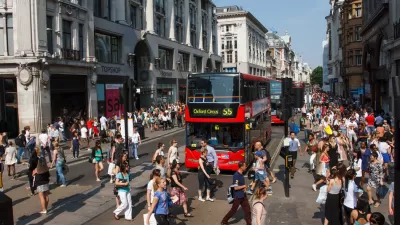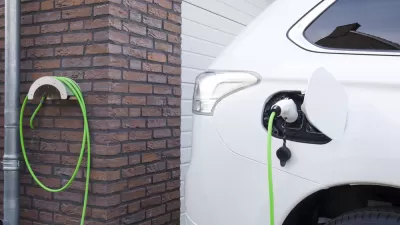Late last month, the UK became the first country to commit to a legally-binding target of achieving net-zero emissions by 2050. A new academic research group recommends reduced auto ownership, regardless of how they are powered, to meet the target.

Roger Harrabin, environment and energy analyst the BBC News. "Shifting the focus: energy demand in a net-zero carbon UK" was released July 5 by the University of Oxford-based Centre for Research into Energy Demand Solutions, or CREDS, which was established last year and works with a team of over 80 academics at 13 academic institutions across the UK.
On June 27, the British parliament "signed a target of net-zero greenhouse gas emissions in law, becoming the first G7 country to set such a goal and cementing the most aggressive transition toward clean energy in the world to date," reported Umair Irfan, who covers climate change, energy, and the environment for Vox.
This accelerates the UK’s current target of cutting emissions 80 percent by 2050 compared to 1990 levels, a goal enshrined in the 2008 Climate Change Act. The UK’s new target is “net-zero” by 2050. It doesn’t mean “no emissions at all” but that any carbon dioxide emitted has to be offset or removed.
Prime Minister Theresa May had announced her support for net-zero target earlier in the month, stating, "This country led the world in innovation during the Industrial Revolution, and now we must lead the world to a cleaner, greener form of growth." British scientists had earlier urged her to make the climate commitment, indicating it would be a significant legacy for her, one which no doubt will stand in sharp contrast to her presiding over Brexit.
Transport & mobility is the fourth chapter of the 108-page CREDS report [pdf]. Much like in California and the U.S., the transportation sector is arguably the biggest climate challenge in the U.K, seeing transportations emissions rise as they fall economy-wide:
Energy use from transport has increased by 16% since 1990 (6% since 2013) against a UK economy-wide decrease of 4% (Committee on Climate Change or CCC, 2018a) and remains 98% dependent on fossil fuels. It has grown as a share of overall carbon emissions with no net reduction between 1990-2017 (vis-à-vis –43% for all sectors combined) (CCC, 2018a).
"Car use is a massive blind spot on government policy," said Jillian Anable, a professor of transport and energy at the Institute for Transport Studies, University of Leeds, and one of the authors of the chapter, adds the BBC's Harrabin.
It warns that electrifying cars will not address traffic jams, urban sprawl and wasted space for parking. The report calls on the government to devise a strategy allowing people to have a good standard of living without needing a car.
“For many years ministers have adopted the principle of trying to meet demand by increasing road space," adds Anable. "They need to reduce demand instead.”
That theme, to "consider and promote all the benefits of demand-side solutions" as opposed to relying solely on technology to provide "clean alternatives," is found throughout the report as well as the name of the center (energy demand solutions).
The authors are supportive of the government's Clean Growth Strategy, the blueprint for Britain’s low carbon future, which calls for phasing out the sale of internal combustion engine (ICE) vehicles by 2040, but believe "the timetable is too slow, and may not be achieved anyway," writes Harrabin.
Lilian Greenwood, chair of the House of Commons Transport Committee, received the report favorably.
She said: “The move to electric vehicles is most definitely not a panacea and fails to address wider concerns about public health and the kind of places where we want to live.
"Congestion is a costly blight in many urban areas and there is a real risk that we will end up swapping dirty, polluting traffic jams for clean, green ones.
"Inactivity and obesity are increasingly serious public health problems. Getting people out of their cars is essential, yet the government has no targets for such a shift - my committee has called for that to change."
To prepare for a shift away from motor vehicles powered by internal combustion engines, Edmund King, president of the Automobile Association and Visiting Professor of Transport at Newcastle University, "suggests perhaps switching vehicle taxation away from petrol and diesel and on to Road Miles – a charge for the miles you drive, imposed electronically," adds Harrabin.
Related in Planetizen:
- Carbon Neutrality: What Does it Mean, and Is it Possible? June 24, 2019
- Phasing Out the Internal Combustion Engine No Easy Task, September 18, 2018
-
Movement Toward Mileage Fee Gains Momentum in U.K. with Truck Fee, December 28, 2017
Hat tip to Leonard Conly.
FULL STORY: Electric cars 'will not solve transport problem,' report warns

Alabama: Trump Terminates Settlements for Black Communities Harmed By Raw Sewage
Trump deemed the landmark civil rights agreement “illegal DEI and environmental justice policy.”

Study: Maui’s Plan to Convert Vacation Rentals to Long-Term Housing Could Cause Nearly $1 Billion Economic Loss
The plan would reduce visitor accommodation by 25% resulting in 1,900 jobs lost.

Planetizen Federal Action Tracker
A weekly monitor of how Trump’s orders and actions are impacting planners and planning in America.

Wind Energy on the Rise Despite Federal Policy Reversal
The Trump administration is revoking federal support for renewable energy, but demand for new projects continues unabated.

Passengers Flock to Caltrain After Electrification
The new electric trains are running faster and more reliably, leading to strong ridership growth on the Bay Area rail system.

Texas Churches Rally Behind ‘Yes in God’s Back Yard’ Legislation
Religious leaders want the state to reduce zoning regulations to streamline leasing church-owned land to housing developers.
Urban Design for Planners 1: Software Tools
This six-course series explores essential urban design concepts using open source software and equips planners with the tools they need to participate fully in the urban design process.
Planning for Universal Design
Learn the tools for implementing Universal Design in planning regulations.
Caltrans
Smith Gee Studio
Institute for Housing and Urban Development Studies (IHS)
City of Grandview
Harvard GSD Executive Education
Toledo-Lucas County Plan Commissions
Salt Lake City
NYU Wagner Graduate School of Public Service




























